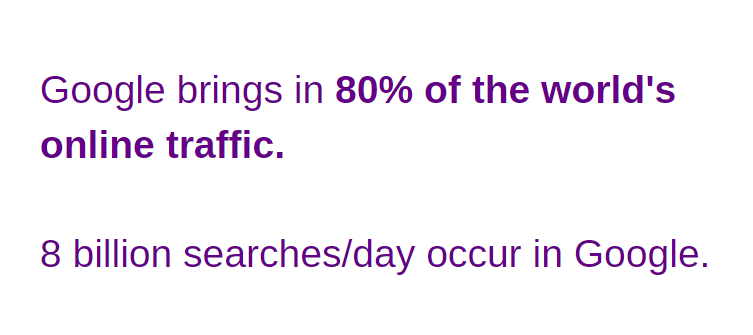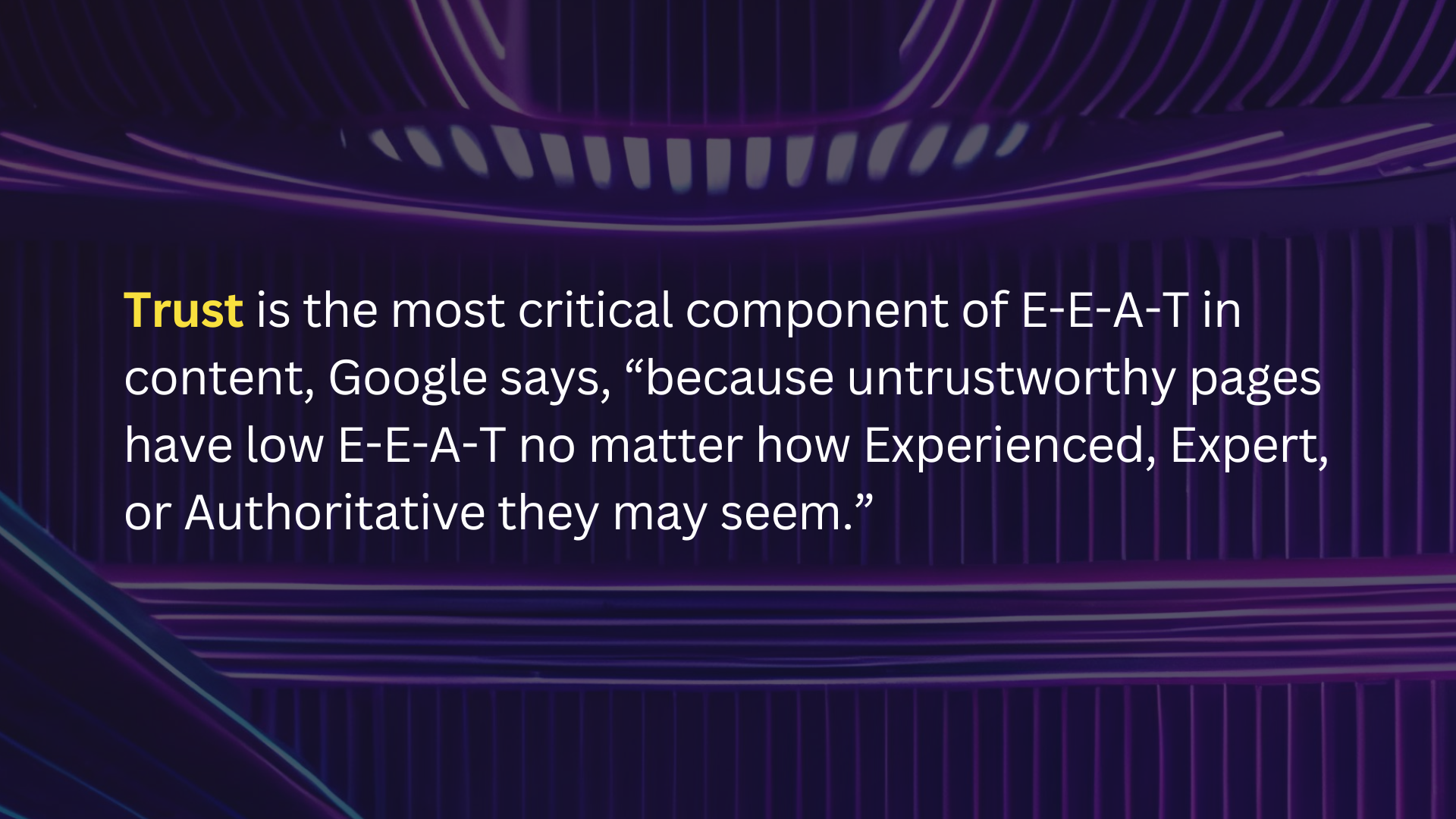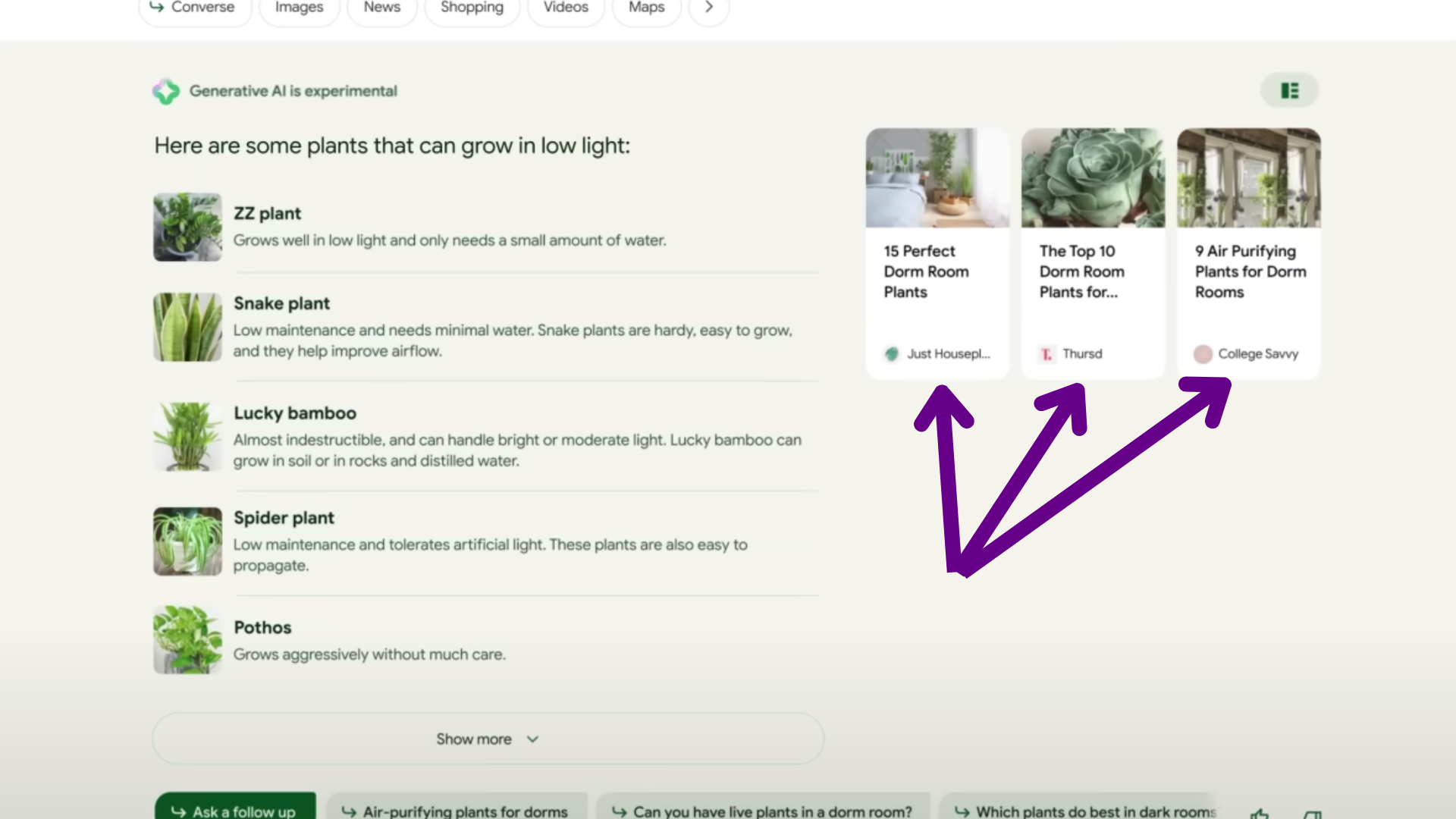So, you’ve heard about Google’s Generative AI. It’s been buzzing in the digital marketing world like a busy bee. You’re curious and perhaps even slightly intimidated by its potential impact on your business.
Will SEO die with AI coming to Google Search?
How can I stay ahead of this curveball from Google?
These are burning questions that we are going to answer in this article. Join us as we explore the rising influence of generative AI on search trends, unpack Google’s E-E-A-T page rating guidelines, and share winning strategies for creating content in the world of generative AI search.
Table Of Contents:
- Google’s Revenue from Search
- Understanding E-E-A-T
- Building Your Authority Online
- How to Win in the Era of Generative AI
- Adapt and Get Ahead of Generative AI Search
First of all, let me tell you that SEO is not dead. Anyone who tells you that is lying.
I remember about nine years ago, Matt Cuts said guest blogging for SEO was dead. But I’m still guest blogging to this day. I’m an author at Search Engine Land and Search Engine Journal and my bylines continue to create enormous traffic and authority for me. This is what E-E-A-T is all about.
But before we go into E-E-A-T, which is Google’s page quality rater guidelines, let’s talk about Google.
Google is a monstrous traffic machine. While it’s easy to think that Instagram can get you millions of likes, hearts, comments, and followers, the truth is that Google brings in 80% of the world’s online traffic.
We’ve seen an astronomical rise in search traffic on Google. The numbers are nothing short of jaw-dropping: from around 3 billion searches per day back in 2020 to nearly triple that amount today — we’re talking close to 9 billion daily searches. Imagine the opportunities for businesses and content creators.

Yes, ChatGPT is now a popular resource for people to go to for answers but it’s not going to ever replace Google simply because Google is ingrained into us as a society.
So how will generative AI — the biggest change to ever hit Google — affect search as we know it? More importantly, how will this affect you?
Google’s Revenue from Search
First, let’s look at Google’s ad revenue and where it comes from.
Search is a trillion-dollar online industry.
In 2022, Google’s total revenue was $224 billion. Google ads contributed $162 billion — that’s 58% coming from Google search alone.
Where does cost-per-click come from? It comes from us creators, publishers, and website owners. We drive the cost up because we create the competition.
Generative AI coming to search will change Google’s whole ad revenue dynamic.

Understanding E-E-A-T
Second, Google has added another “E” to its E-A-T page ranking guidelines.
What does E-A-T mean?
Expertise
This pertains to your degree of proficiency or capability in a particular field. Are you a subject matter expert? Can you provide insights based on first-hand experience or education?
Authoritativeness
Your reputation matters here. What do other industry leaders think about you? Have others recognized your expertise through mentions or citations?
Trustworthiness
Trustworthiness is the most important factor in Google’s E-E-A-T. A website is considered trustworthy if it is accurate, reliable, reputable, honest, objective, and secure.

In December 2022, Google added Experience to its page rater guidelines.
Where does experience come from?
From your personal journey, your personal touch, and your firsthand knowledge of things.
If you’re writing about food, how did it taste like?
If you’re writing about skydiving, how did jumping out of a plane feel like?
A robot, on the other hand, cannot see, hear, smell, taste, or touch. If you publish AI-written content without adding E-E-A-T, it will probably fail to rank.
Why does Google give so much importance to E-E-A-T?
It’s simple: Google wants to provide users with the best possible information for their queries. If you’re an expert in your field, have built a reputation of authority, and are trusted by others, then it makes sense for Google to place your content at the top of its search results.
So what is trustworthy, high E-E-A-T content?
It’s content from a person with a wealth of personal experience.

For example, would you trust a product review from someone who has personally used the product or a review from someone who has not?
Google warns users not to trust low E-E-A-T content, especially when it’s about a YMYL topic.
YMYL, short for your money your life, refers to financial, legal, and medical content. Those are the hardest categories to write about.
Back when I was running a writing agency, we had to hire an actual registered nurse because no writer could fabricate that type of knowledge and expertise. More importantly, YMYL information without E-E-A-T is tantamount to harmful content as it would put people’s lives in danger.
Content that’s not written by an expert and is riddled with inaccuracies is considered untrustworthy, superficial garbage that will get the lowest rating from Google.

Extremely negative reputations — both for your website and your social media presence — can also lead to low E-E-A-T.
Are your website content and social media content topically relevant? Or are you talking about baking and cooking on Facebook while talking about building a law firm on your website?
What are people on Reddit and Quora saying about you? Is your reputation on Glassdoor, Capterra, or G2 low or is it zero?
With E-E-A-T, a publisher’s expertise and reputation matter more than they ever did.
This is true, especially going into the age of AI. Get more bylines from guest blogging, get cited in other publications, and go speak at industry events to build your authority.
You can publish high E-E-A-T content by doing one of two things:
- Be an actual expert on your topic.
- Hire an expert to create content with AI.
Artificial intelligence is the future of SEO content writing.
Thanks to AI, we can now 10x content creation which is pretty incredible but you still want a human expert running the show.
Building Your Authority Online
One thing we did at BrandWell was hire an amazing digital marketing manager who comes from a social media background — she used to run Twitter chats for Semrush. Now you can see our social media kit is getting better and better, which elevates our brand presence on social media.
I’m not talking about posting a reel every day. I’m talking about getting content out on Facebook, Twitter/X, LinkedIn, YouTube, and Instagram to show off your experience, even if it’s just one post a week or two posts a month.
If you’re an agency, you can highlight the stories of your clients. You don’t have to fabricate social media content that answers E-E-A-T because this is firsthand experience coming straight from your customer.
Remember: your goal is to be the uniquely authoritative go-to source in your niche or your client’s niche.
If you can’t be the uniquely authoritative go-to source for that topic, pick another topic that you are willing to settle in and build on for years. If you have a lot of knowledge about SEO and you’ve been publishing websites for years, you can easily build up content on a website, flip it, and make money.
But if you’re not that type of expert, it could take some serious time to build E-E-A-T. It took me 10 years to build my first website to 100,000 per month in traffic and revenue, and I did that 100% organically without ads. To become the uniquely authoritative go-to source in my niche, I built up my website with thousands of blog posts about content writing, content marketing, blogging, and every topic under the sun. By the time I sold my writing agency, it had achieved a domain rating of 70.
If you want to win when generative AI comes to search, this is the secret formula — publish content at scale, build links to highly credible sources, and get those bylines, mentions, and citations all across your industry.
Here’s the cool thing about what’s coming to AI in search: Google isn’t going to feature big publication names like Forbes anymore. They’re going to showcase niche sites and give them attributions above the fold of the Google search generative experience (SGE).

Have you answered every question on the topic on your site? Have you done a good job representing yourself on social media? Are you consistently publishing good content?
These are the keys to getting featured on Google SGE.
How to Win in the Era of Generative AI
The digital landscape is changing, and Google’s generative AI is leading the charge. Let me guide you through some practical strategies to navigate the future of SEO.
Focus on Specific Niches
In a world flooded with content, specificity has become more crucial than ever. Focusing on a particular niche helps your content stand out and increases its relevance for targeted search queries.
For instance, instead of writing about ‘dog training’, you could narrow it down to ‘training Golden Retrievers for agility competitions’. By doing so, your material becomes hyper-relevant for those seeking that specific information — increasing your chances of ranking more prominent in SGE.
Answer Every Question on the Topic
We’re living in an age where people expect immediate answers at their fingertips — literally. As such, comprehensive coverage of any topic isn’t just good practice; it’s now expected by users and ranking algorithms alike.
Pages answering multiple related queries rank higher on Google than those focusing only on a single keyword.
Attract High-Quality Backlinks
No discussion about winning in SEO would be complete without mentioning backlinks, and it’s not just about quantity — quality matters.
A high-quality backlink from an authoritative site is worth much more than several low-quality ones. A good starting point? Reach out to other niche-focused websites for guest posting opportunities or collaborative content creation.
Adapt and Get Ahead of Generative AI Search
This year at BrandWell, we have crushed it in the rankings.
We now have over 47,000 keywords and they’re all around topics that matter to us.
We’re already ranking for free AI detector which is one of the tools we offer with our AI writer.
We’re talking about ChatGPT and how to write content with AI. And on the Content Hacker page, which is our educational arm, we’re talking about an even broader range of topics such as how to use your email in a smarter way and how to stay motivated while you work from home because these are things that matter to a content hacker — someone who creates content for growing their business.
So think about the topics that you want to be known for and stick to those for your website. I’m telling you you’re going to kill it and get traffic that’s going to convert!
Last tip, I would really encourage you to play around with Google Search and the generative AI box. See what kind of answers come up.
Want to win in Google’s generative AI search? Think like the user: Is this piece of content going to help me? Maybe what’s going to help me is clicking on a result and reading an in-depth guide from an expert who actually has experience.
Now is not the time to fear AI. While generative AI has become very disruptive across all industries, it also presents an ocean of opportunities waiting just for you.
Get ahead of the game and start building your authority with BrandWell.




